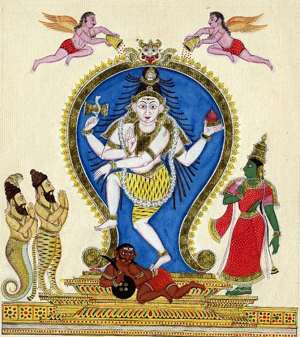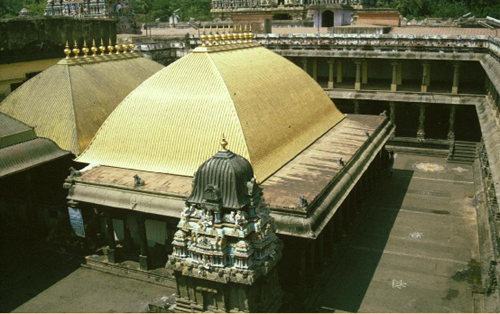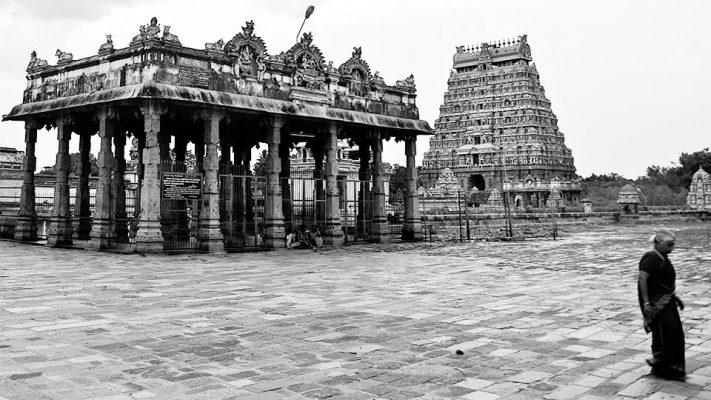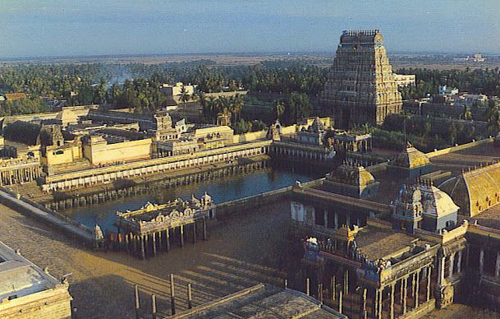These verses are taken from the final chapter (‘The Gaining of the Divine Feet’) of the Tiruvadavur Adigal Puranam.
510
Like a single great lion vanquishing a herd of massive elephants, Vadavur [Manickavasagar] defeated those religions which attempt to sway those who listen by presenting falsehood is if it were truth. We shall now tell how he, who through the might of his penances over many births came to proclaim the true knowledge of Siva, so hard to grasp finally attained to [the feet of the Lord].
511
After he had sung the victorious and beloved ‘Marshalling of the Sacred Host’, ‘The Sacred March,’ ‘The Wonder of Salvation’ and ‘The Pilgrim Song,’ he attained to the blissful greater life in which there is no seeking, no alternation of fear and release from fear, no wretched suffering or joyous exhilaration.
The four titles are hymns 49, 46, 51, and 45 of the Tiruvacagam.

512
He who came to speak the holy Tiruvacagam, wherein is expounded the true knowledge of Lord Siva, which dispels affliction, so that the glory of the holy ash and the sacred five letters might shine out over the earth, gazed upon, as if it were Sivaloka itself, the city of Chidambaram, where the Lord resides within the Golden Hall, as the tiger Vyagrahpada and the serpent Patanjali bow down meekly before him to attain salvation.
513
In the days that he dwelt there, the Lord who dances within the Hall took on, out of his compassion, the form of a learned brahmin. Wearing across his breast the pure three-stranded cord, and holding in his hands a weighty tome, he came walking, causing pain to his tender, reddened feet, and stood before the sage.
514
With a sweet expression his face the sage turned to the eminent brahmin who stood before him and bade him be seated, then said, ‘Tell me, you who are versed in the mighty Vedas’ arcane lore, whence are you come?’ to which he replied, ‘I am from the Pandiyan land, whose riches are great and enduring.’
515
Upon hearing the words ‘Pandiyan land…’ Vadavurar, his words overflowing with friendliness and affection, said, ‘Please tell me the reason why you have come to this place.’ ‘It is a mission undertaken at the behest of the Lord who rules our souls,’ he replied. ‘Namely, to seek an audience with your very self.’ Then, to make his meaning clear, he continued thus,
516
‘The Pandiyan land is indeed blessed by your greatness, which caused the Holy One, who dances in the Hall of Dharma, to appear to you, mounted upon a steed, whilst in days of yore, even Visnu, who burrowed down through the earth, and Brahma, who flew up to the highest heaven in the form of a swan, could not see and know Him, seek as they might.
517
‘Everyone was filled with a great joy when they heard how you performed holy service to the Lord in southern Perunterai. How, with untroubled heart, you visited the tank-girt holy Eagle Mount, and how, on reaching the glittering Hall of Gold, you defeated the Buddhists in debate.
518
‘Foremost among brahmins, I have come here at this time to learn and recite the collection of Tamil hymns which out of your great devotion, you sang in praise of the Primal One, he who dances within the Golden Hall. For thus will the torment of birth be dispelled. I beg you here and now to speak them out in a clear voice, so that I may write them down.’
519
On hearing these words from the Lord whom even the gods in heaven praise, the sage Vadavurar, who, inspired by the great love within his mind and heart, had composed hymns in the Tamil tongue (whose glory is hard to measure) in praise of the Lord with the fair matted locks, spoke forth joyfully, with melting heart, those holy hymns which express the true knowledge of reality.

520
The Lord who dances in the Golden Hall, taking up a palm leaf page in his fair hand, faithfully recorded every word that he uttered. Then he whose grace is overflowing addressed Vadavurar saying, ‘Now you must compose a kurai love poem concerning the lord who shares his form with the fair Maid, so that all may recite it and be freed from the ills of birth.’
The poem referred to is Tirukovaiyar, the other work attributed to Manikkavasagar. A kovai is a love poem in which the setting is a forest glade, where the lover and beloved pass through the various stages of love, from first sight to final union. It is an allegory in which each stage of the love developing between the lover and the beloved is interpreted as a stage on the souls’ journey to union with Lord Siva.
521
Joyfully assenting, Vadavurar, whose penances over many incarnations were great indeed, recited the holy Kovai, as the Lord, whose matted locks shine like gold, sat before him, writing it down. When it was finished, he hid the book from sight, and vanished like a flash of lightning, at which the wise bard fainted quite away.
522
Coming to his senses, Vadavurar rushed everywhere looking for him, and thinking to himself in his deep distress, ‘What can be the meaning of this?’ Then, realising that the brahmin was none other than the Primal One who dances in the Golden Hall, he dissolved in floods of tears, crying out, ‘Where have you gone?’ and collapsed to the ground, as the surging ocean of Supreme Bliss engulfed him in its flood.
523
Lord Siva, who excelled in his love for the pure Tamil tongue, repaired swiftly to his stately palace. Then, with a joyful expression, fixing his gaze upon Visnu, Brahma and the hosts of the gods, he exclaimed, ‘Listen to these good hymns that one of our devotees has composed in my praise, out of the great devotion he bears me.’ So saying, he graciously read them out.
524
At the end of the Tirukovai, which has the power to confer final liberation, the Lord inscribed the words, ‘This work, spoken aloud by the true devotee Vadavurar, is written in the hand of Him who dances in the Golden Hall.’ Then, in his own hand, which resembled a beautiful lotus blossom, he embellished the manuscript in a fitting manner.
525
Desiring that the whole world should know of the great spiritual attainment of his loving devotee Vadavurar, the wise Lord, whose locks are crowned with the crescent moon, placed the true text of Tiruvacagam upon the holy steps, at the portals of the beautiful Hall where revered ascetics, and the gods themselves, come to pay homage.
526
When, after it was placed there, a brahmin who performed puja in the shrine came and saw the book and realised that the miracle of its appearance there was a divine act, he stood motionless, his mind dissolved in bliss. Then he rushed out of the Hall, thinking to himself, ‘All the inhabitants of Chidambaram must be informed at once of this occurrence.’
It was deemed a ‘miracle’ because the temple had been locked all night, meaning that no human hand could have placed the manuscript there.

527
Entering the august presence of the elders of the city of Chidambaram, abode of the red-hued goddess Laksmi, that brahmin informed them of its occurrence. As soon as he had finished speaking they cried out, ‘This is indeed a miracle!’ and came rushing to behold that book which the Lord had placed on the steps of his own shrine.
528
Having debated the matter amongst themselves, all agreed that, since even the gods were forbidden to enter the Golden Hall where the Lord dwelt, this occurrence must be the doing of Lord Siva himself. ‘Surely it is fitting,’ they said, ‘that we should look to see whether this is a Saiva Agama, or a work of the common language of pure Tamil which he has uttered out of his great love for us.’
529
In accordance with the words of all his companions who were deeply imbued with the Lord’s love and grace, one of their number stepped forward, his arms laden with flowers, and prostrated himself in worship. Then, taking up the book left there by the one whose locks are suffused with the fragrance of kondrai flowers, he broke the seal and recited the first four holy hymns, written in the metre called agawal.
Poems two, three and four were composed in the agawal metre. The first, Siva Puranam, is written in the kali venba metre.
530
Next he recited the remaining 600 verses of the Tiruvacagam, that ornament of the fair Tamil tongue, beginning with the Sacred Cento, followed by the glorious 400 verses of the holy Kovai, which is elaborated in the style of love poetry. Coming to the end, he read out the final words, ‘This book was written down from the dictation of the noble Vadavurar by the hand of the Lord of the Sacred Hall’.
531
When they heard these words, the hair on their heads stood on end and beads of perspiration stood out on their bodies. They shed abundant tears, and their hearts melted in bliss, as they cried out, ‘Can there be any Saivite work that more clearly points the path of liberation than these Tamil hymns, composed by one so rich in holy penances, accumulated [over many births]?
532
Thinking to themselves, ‘From the lips of the great ascetic, Vadavurar, he who praises the holy name of him whose ornament is the serpent, we shall learn this very day the wondrous inner meaning of this work,’ they left that noble hall and came to him who was deeply versed in the Vedas’ lore and who vanquished in a great debate the deluded Buddhists who revere the shade of the bodhi tree.
533
When they had all came to stand respectfully in his presence, and placed before him the holy scripture, saying, ‘See what a miracle the Lord of Heaven has performed this day!’ that loving devotee wept, saying, ‘What austerities can I have performed in previous lives that the Lord himself should joyfully deign to write own my poor collection of hymns in his own hand?’
534
When he had finished weeping in this fashion, those citizens of Chidambaram, whose devotion is hard to measure, joined their hands in joyful worship before him and entreated him saying, ‘Pray tell us, what holy deeds our Lord, appearing upon this earth, performed to inspire you to write these holy hymns, so harmonious, and so deeply imbued with the knowledge of Lord Siva.
535
After he who was free from the sorrows of birth had finished recounting all the exploits of the Lord, the citizens of Chidambaram bowed down before him, and cried out with joyous hearts, ‘We beg you to expound to us the deep and true inner meaning of this Tamil work which you dictated to our Lord in Tillai.’
536
Our great Master who dwells in holy Vadavurar, of wide renown, exulted in his heart, that overflowed with the knowledge of Lord Siva, and said, ‘This I shall reveal to you after I have entered the beautiful Golden Hall.’ With these words he set off, with those who had come to see him following devotedly behind.

537
With the people of Chidambaram, whose renown is ever unfailing, crowding closely about him, filled with devotion, he reached the Hall of pure gold, wherein God’s grace abides. Saying, ‘He it is who is the meaning of this worthy Tamil garland,’ he went swiftly into the Hall, and there, even as they all looked on, he disappeared from view.
538
Pointing with his hand, even as his body vanished, and saying, ‘He is the Reality, the one who dwells in Tillai, girt by rice fields and groves of areca trees,’ Vadavurar disappeared from view. Thus it was that the Lord who wears as an ornament a great serpent with its expanded hood, showed his true love for his devotee, and took him to himself, even as water mixes with milk.
539
Those who are caught in the net of maya, failing to realise that the body, composed of loathsome skin, bones, sinews and filthy pus, partakes in reality of the nature of Lord Siva, and wander over the world in confusion, seeking sustenance for this fleshly body, shall descend into the deepest pit of Hell.
540
When the people of Chidambaram observed that which befell him who loved the divine one, King of the gods, their hair stood on end and they stood there, trembling. Tears coursed down as their hearts melted, and sweat broke out over their whole body as, filled with joy, they pressed their palms together in worship.
541
The bhutas started to dance as the heavenly hosts gathered round, rejoicing and singing praises. Tumburu and Narada played melodies. The Vedas, accompanied by heavenly drums, arose, raising their clamour on high. The great rishis and Indra [with the rest of the gods] showed their veneration as they poured down a rain of beautiful blossoms from the five flowering trees of heaven.
542
Those whose hearts are the abode of the holy name of Lord Sankara, who perform the dance of true knowledge, those who lovingly perform Siva puja in silence, using fragrant essences, and those who are exalted by dwelling with flawless devotion in the southern city of Chidambaram, all enjoyed the blissful delights of the Tiruvacagam, which even the gods in heaven praise.
543
Those who recite the holy history wherein shines forth the divine truth of the brahmin Vadavurar, and those who listen to it, taking it in with their good ears, shall win great renown, along with the blissful experience conferred by the jnana which is true knowledge, and when their births are finally exhausted, they shall attain to the illustrious realm of Sivaloka which is free of all taint.
544
Long live the Goddess Earth!
Long live the rains that pour down like gold!
Long live the Vedas and Agamas!
Long live the sovereign’s just rule!
Long live the flawless five letters,
the holy ash, and the devotees of Lord Siva!
Long live those who read and those who hear
the Purana of the exalted Lord of Vadavur!